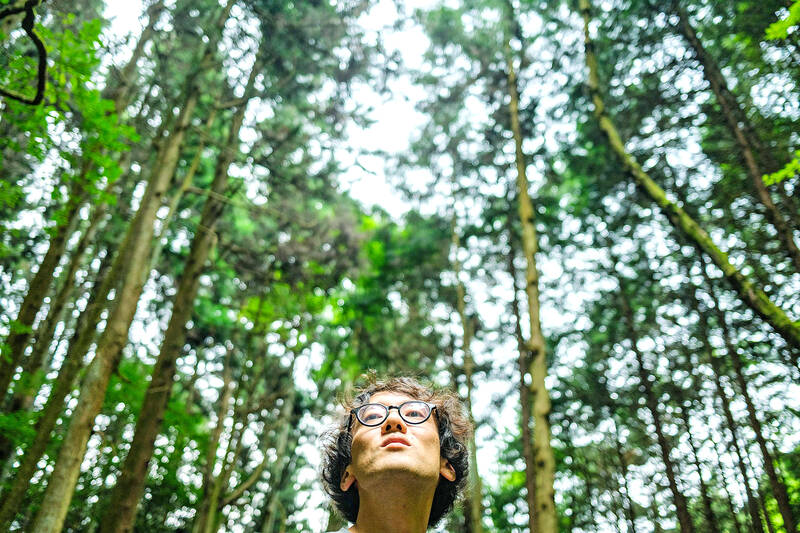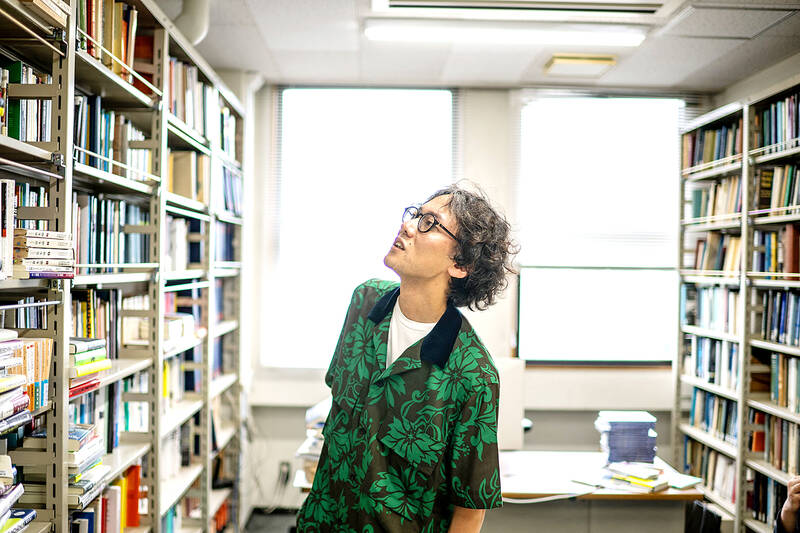As Tokyo’s millions put in another day’s work on the coalface of capitalism, celebrity Marxist philosopher Kohei Saito and his friends are clearing rocks from a muddy mountain stream.
Saito’s core argument — that capitalism is the root cause of climate change and we need to stop chasing growth to save the planet — has struck a chord in the world’s fourth-largest economy, especially among young people.
The associate professor at the University of Tokyo has sold half a million copies of his latest book and last month spoke at music festival Fuji Rock, headlined by The Killers.

Photo: AFP
He has become a face of the global movement for “degrowth” — a word that “kind of freaks people out,” as Saito put it while he tended to his slice of collectively owned land on the capital’s western outskirts.
“Maybe it’s not the best way to convince people, especially in America,” said the 37-year-old, whose hit title Slow Down: The Degrowth Manifesto came out in English this year.
But using the term is one way to “provoke or challenge” widely accepted economic principles which are leading to environmental ruin, he said.

Photo: AFP
Saito is not a member of the Japanese Communist Party and he rejects the need for top-down, Soviet-style systems.
Instead he believes in grassroots change led by projects such as Common Forest Japan, his attempt to reconnect with nature and build a democratically run community.
“Unless the left or liberal, progressive side offers a more attractive vision of the future... right-wing populism will take advantage of this crisis,” Saito said.
He is a regular TV news talk show guest, and recently made headlines for saying he was boycotting the Olympics, citing its “excessive commercialism” and “double standards” over Israel’s participation and Russia’s exclusion.
‘DEGROWTH ISN’T JUST FRUGAL LIVING’
Saito’s calls for a world where fewer things are produced — reducing carbon emissions — and a break with overconsumption and long working hours have resonated with those disillusioned with the status quo in Japan.
The Japanese version of Slow Down came out in 2020, when the pandemic brought many industries to a standstill.
“I didn’t expect this was something people would be interested in, because Marx is outdated” and degrowth could sound like “some kind of negative dictatorship,” he said.
Yet coming of age after Japan’s 1980s boom years, Saito’s generation has seen decades of economic stagnation despite the pursuit of growth, he contends.
So “that kind of discussion has some attraction, especially to young people who don’t fetishize the old kind of Japanese miracle anymore.”
New technologies such as electric cars, carbon capture or nuclear fusion cannot solve the climate problem in a system that is always seeking greater profit, Saito said.
Banning private jets and “excessive public advertisements” as well as “introducing a much more radical wealth tax” could be a starting point instead.
“But I also want to emphasize that degrowth is not simply about giving up everything and living in frugality,” said Saito.
It’s about challenging capitalism’s sense of “scarcity” that makes people insecure about the future — a stress they try to overcome with shopping and other intensive consumption which in turn “destroys the planet.”
‘NO GREEDY BEHAVIOR’
On the mountainside, the slim, round-spectacled philosopher, his wife and two children, and around 20 others climbed up the stream’s banks, home to worms and wild mushrooms.
They moved stones and branches to allow the water to flow more easily, trying to reduce the risk of landslides.
Although his ideas could sound far-fetched to minds “almost dominated by the logic of capital,” Saito says the forest project exemplifies a society where there is “no greedy behavior — because it doesn’t make sense.”
Growing up in Tokyo, Saito wasn’t much of a hiker and his parents weren’t political.
He discovered socialist thinkers like Noam Chomsky as a teenager interested in his “criticism of American imperialism.” Years later, Japan’s 2011 tsunami and Fukushima nuclear disaster brought home “the unsustainable relationship between humans and nature.”
While pursuing his PhD in Berlin, Saito investigated Marx’s take on ecology in the German’s notebooks from his later years.
The idea of degrowth dates back to the 1970s, but has gained traction recently with a slew of new books including Less Is More: How Degrowth Will Save the World by economic anthropologist Jason Hickel.
Saito makes clear in Slow Down that for now his ideas only apply to the world’s rich countries, which are disproportionately responsible for climate change.
Despite being a keen observer of local politics, as a philosopher, he says tricky decisions, like how much new infrastructure is too much, are not his to make.
“I’m not a good politician. Because politics is about compromise, right?”

The Directorate-General of Budget, Accounting and Statistics (DGBAS) told legislators last week that because the Chinese Nationalist Party (KMT) and Taiwan People’s Party (TPP) are continuing to block next year’s budget from passing, the nation could lose 1.5 percent of its GDP growth next year. According to the DGBAS report, officials presented to the legislature, the 2026 budget proposal includes NT$299.2 billion in funding for new projects and funding increases for various government functions. This funding only becomes available when the legislature approves it. The DGBAS estimates that every NT$10 billion in government money not spent shaves 0.05 percent off

Dec. 29 to Jan. 4 Like the Taoist Baode Temple (保德宮) featured in last week’s column, there’s little at first glance to suggest that Taipei’s Independence Presbyterian Church in Xinbeitou (自立長老會新北投教會) has Indigenous roots. One hint is a small sign on the facade reading “Ketagalan Presbyterian Mission Association” — Ketagalan being an collective term for the Pingpu (plains Indigenous) groups who once inhabited much of northern Taiwan. Inside, a display on the back wall introduces the congregation’s founder Pan Shui-tu (潘水土), a member of the Pingpu settlement of Kipatauw, and provides information about the Ketagalan and their early involvement with Christianity. Most

The People’s Republic of China (PRC) was out in force in the Taiwan Strait this week, threatening Taiwan with live-fire exercises, aircraft incursions and tedious claims to ownership. The reaction to the PRC’s blockade and decapitation strike exercises offer numerous lessons, if only we are willing to be taught. Reading the commentary on PRC behavior is like reading Bible interpretation across a range of Christian denominations: the text is recast to mean what the interpreter wants it to mean. Many PRC believers contended that the drills, obviously scheduled in advance, were aimed at the recent arms offer to Taiwan by the

Like many retirement communities, The Terraces serves as a tranquil refuge for a nucleus of older people who no longer can travel to faraway places or engage in bold adventures. But they can still be thrust back to their days of wanderlust and thrill-seeking whenever caretakers at the community in Los Gatos, California, schedule a date for residents — many of whom are in their 80s and 90s — to take turns donning virtual reality headsets. Within a matter of minutes, the headsets can transport them to Europe, immerse them in the ocean depths or send them soaring on breathtaking hang-gliding expeditions